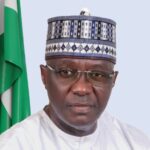The federal government and experts have called for urgent actions in tackling the impact of climate change on health.
They made the call in Abuja during this year’s Future of Health Conference organised by Nigeria Health Watch. The theme of the conference was “From Evidence to Action: Building Resilience at the Climate-Health Nexus”.
The Coordinating Minister of Health and Social Welfare, Prof. Muhammad Ali Pate, said the climate and health challenge is not just a concern for the future but very much a reality today.
He stated that while the climate challenge is global, the solutions must be localised, grounded in the context of our respective countries.
- Oil and gas made Nigeria to neglect tourism – NBA-SBL Chair
- Deposition: Again, court rules in favour of former Emir of Gwandu
“Localising our response is essential to addressing our unique challenges and leveraging our available resources effectively,” he said.
He said this year, Nigeria has faced significant climate-related disruptions, including widespread flooding and droughts in various regions, adding that the environmental shifts have brought with them a sharp increase in climate-sensitive diseases.
He said, “In December, during a visit to Kano, community leaders expressed concern about seeing malaria cases during a time of year when it is usually not prevalent. We are also witnessing the emergence of new vectors, such as dengue in Sokoto and yellow fever in other regions. Additionally, cholera outbreaks linked to contaminated water sources and other enteric diseases are becoming more frequent.”
The minister said the effects of climate change are not confined to infectious diseases, adding that, “The air quality has worsened, exacerbating both infectious diseases and non-communicable diseases (NCDs), such as respiratory issues and cardiovascular conditions, which now represent the fastest-growing health burden in Nigeria. The adverse effects on food systems, leading to malnutrition and food insecurity, are also a major concern.”
Prof. Pate said in the northern regions of Nigeria, desertification is an ongoing issue with communities being forced to abandon their homes, leading to migration and conflict.
To address the challenges, Prof. Pate said there is need for a robust health system, stressing that governance, policy, and multisectoral collaboration are critical.
He added that improving health outcomes must begin with a strong emphasis on primary healthcare, which serves as the foundation for resilience against climate-related and other health threats.
The Managing Director of Nigeria Health Watch, Vivianne Ihekweazu, said addressing health impacts linked to climate change requires a multisectoral approach that brings together diverse stakeholders.
She said research and academia have a role to play, noting that robust evidence is at the heart of every effective intervention.
While acknowledging that the private sector is integral in bringing innovation to address often seemingly complex issues, she said climate resilience in health cannot be built without strong leadership and policy frameworks that integrate health, agriculture, environment, and energy.
She said the future of health conference which began 10 years ago has grown into a platform for meaningful discourse, powerful partnerships, and actionable insights.
Dr Tamer Samah Rabie, lead health specialist at the World Bank, said Nigeria is making significant strides in building a climate-resilient health system through policy adaptation and primary healthcare strengthening.
“Nigeria is taking strong steps towards climate resilience, particularly through primary healthcare strengthening and collaborative health sector reforms,” he said.
Meanwhile, stakeholders in the health and climate space have also called for inclusion of the voices and expertise of youths in mitigating the impact of climate change on health.
They made the call in Abuja during the youth pre-conference ahead of the Future of Health Conference organised by Nigeria Health Watch.
Managing Director of Nigeria Health Watch, Vivianne Ihekweazu, said, “As a country, we have a very young population, with 42% of Nigerians aged between 0 and 14 years. If we do not bring in young people, are disproportionately affected by climate change, then we are simply talking to ourselves.”
She said young people constitute the largest population in Nigeria, and it is important for them to be better educated about the impacts of climate change.
She said, “How are young people becoming activists and focusing on their local government chairmen, state governors, or using their collective voices? Young people have very powerful voices that are not constrained by finances. And those voices have to be used because other countries have used youth voices to lead to change.
“Young people are creating apps to track changing weather patterns. How are we using that to inform policy? Some of our states are huge emitters of air pollution. Are we using young people to create innovations that can track air quality in a state or track water quality? How do they use that information to inform policymakers to make sure that we have clean water sources, and that our environment is kept clean.”
She highlighted that while Africa contributes only 4% to global greenhouse gas emissions, countries like Nigeria suffer the most from the impacts of climate change as it already has a weak health system.
She also called for climate-ready health infrastructure in the country, saying it would help vulnerable groups like women and children to access healthcare.
Dr Jennifer Ayanti, Deputy Managing Director of Strategy and Growth at Society for Family Health, stressed the importance of involving young people in technological advancements to push climate action.
“There are various technological tools that can be used to amplify their voices: social media, digital apps, and other media platforms. Youth can use these tools to drive community health and climate initiatives,” she said.
Executive Director of the International Climate Change Development Initiative, Olumide Idowu, encouraged young people to engage with local government structures, emphasising that meaningful change starts at the grassroots level.
“We live in local communities, and when you tackle problems in your immediate environment, you create the change you want to see,” he said.
Chris Ngwodo, Director General of the Office for Strategic Preparedness and Resilience, also known as Nigeria’s National Early Warning Centre, said the youth could get involved by familiarising themselves with national climate policies and distributing their advocacy efforts beyond the federal level to the states and local governments.
He said at the national level, the organisation provides alerts and forecasts about rainfall, and the changes in rainfall patterns that might trigger flooding.
Ngwodo said the organisation was however working towards building capacity at the state and local government levels to be able to respond effectively to floods.
He said, “The states and local governments have to be able to respond both proactively and reactively; proactively in terms of maybe evacuating people from flood-prone areas. Reactively in terms of dealing with the aftermath of the flood itself.
And then of course being able to invest in climate-resilient infrastructure so that you don’t have a situation where rainfall immediately causes flooding in vulnerable communities.”

 Join Daily Trust WhatsApp Community For Quick Access To News and Happenings Around You.
Join Daily Trust WhatsApp Community For Quick Access To News and Happenings Around You.



